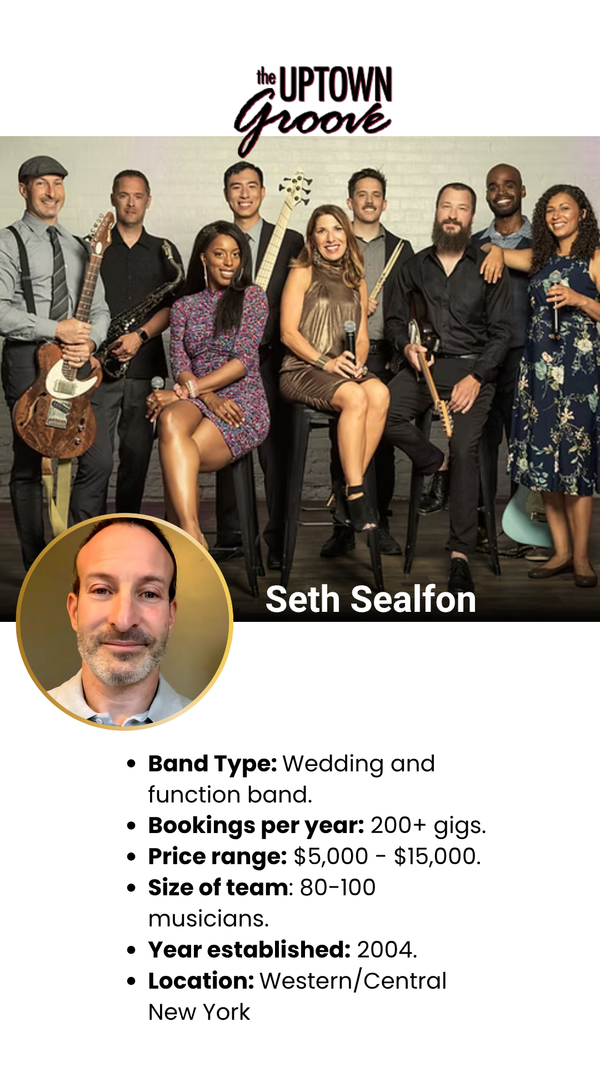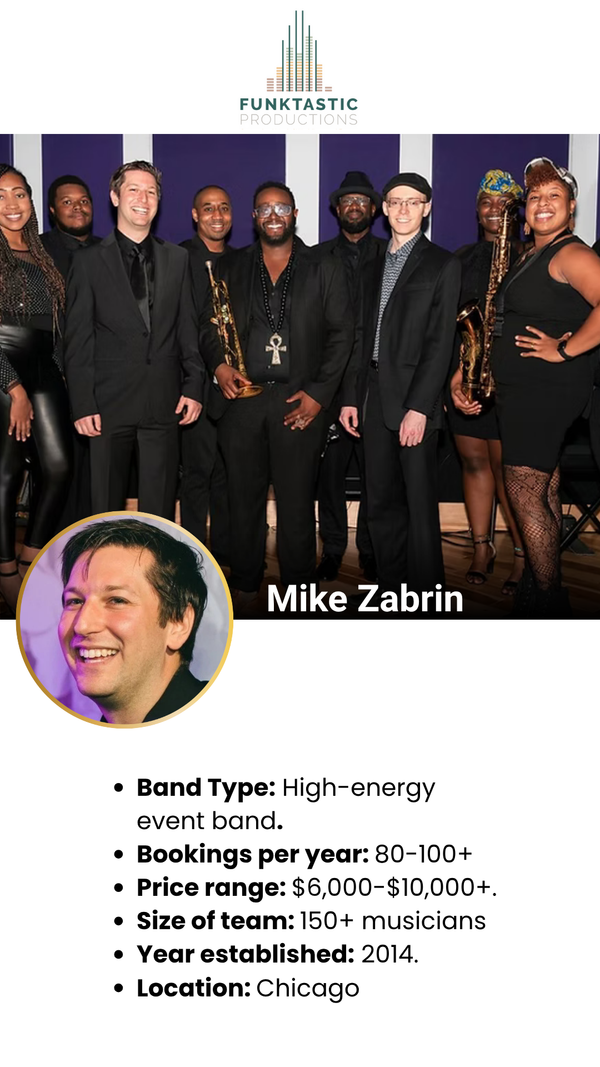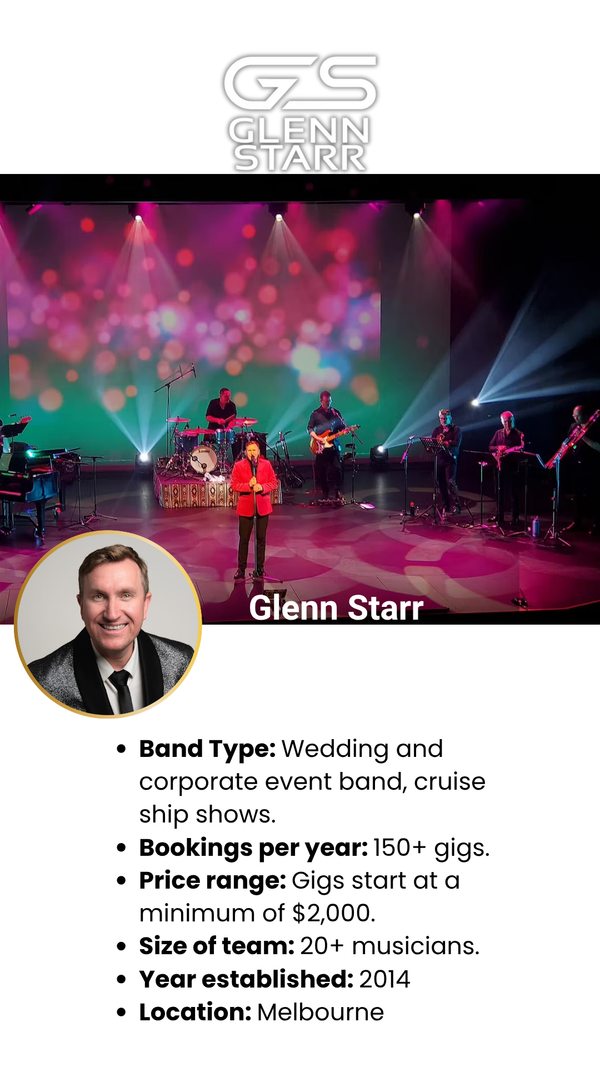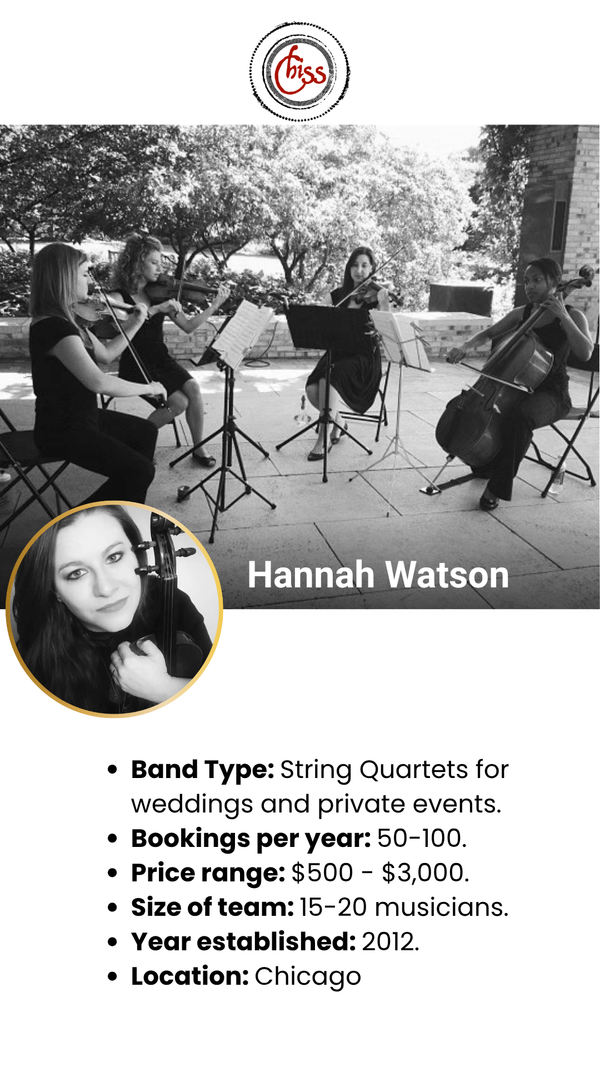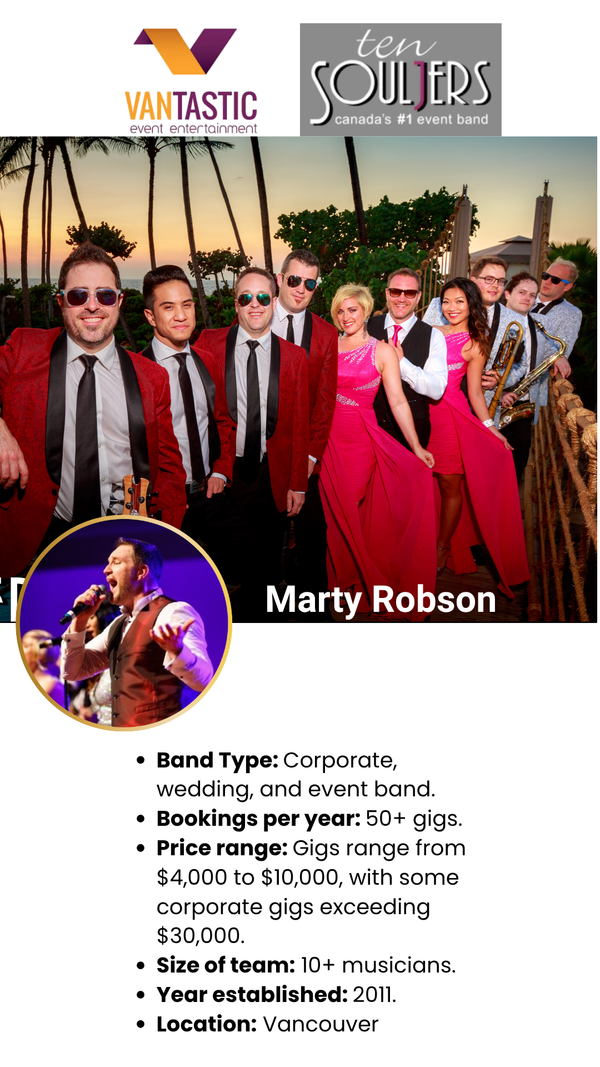3 Warning Signs Your Band Will Fail (And How To Prevent Them)

According to entrepreneur.com, "approximately 20 percent of small businesses fail within the first year. By the end of the second year, 30 percent of businesses will have failed. By the end of the fifth year, about half will have failed. And by the end of the decade, only 30 percent of businesses will remain — a 70 percent failure rate."
So, I've got one question for you: Will your band be part of that 70%?
In case you were wondering, yes, your band is a "Small business". If your band makes, or plans to make more than $100K per year, it is advisable in most regions that you "incorporate" your band for tax purposes. You may also need a business licence, insurance, an accountant and many more requirements in place to grow your business successfully.
But if you're just a "bunch of guys doing what you love", then you don't really need to worry about any of that, right?
Wrong!
Unless you intend on never gigging and not selling your music or services at all, you need to have a plan in place for how you will scale your music project sustainably. In the great words of someone I don't remember, "If you don't plan where you're going, you're not going to get there." So let's plan!
Some say that the music business is 10% music and 90% business. So, having good business tools in place is essential for earning a living making music, which is what you really want, isn't it?
Ideally, your individual "music business" situation will involve a lot more than just 10% music (because you probably got into music for the love of playing and creating, not chasing emails all day), but without adequate systems to manage your business, you may spend so much too much time "in the trenches" and burn yourself out. And if you ignore the "business" and only make time for your music, that's a surefire path to financial ruin.
Why Is Your Band Most Likely To Fail
Let's talk about a few of the reasons that bands fail.
For the purpose of this article, we're going to focus on the business-level reasons, rather than the more subjective "art" side of things. It's probably obvious that your band will fail if you write terrible sounding songs or if your performance sucks. But since it's harder to write a guide on such subjective matter, we'll stick to some real actionable steps you can take to prevent business failure.
Warning #1: You're Not Running Your Band Like A CEO

One of the main jobs of a CEO is to create and uphold a vision and prioritize this over the "daily grind".
As a bandleader or owner, it's not always possible to remove yourself from the daily grind (sending emails, managing contracts and invoices, bookkeeping etc), especially if you're a one-man team, but having a clear vision that you have written down and that you review on a weekly basis will really help.
As a band CEO, your vision might include goals and high-level company strategy. Goals could be things like:
- Doubling the number of gigs you had this year over last year
- Win the "Couples Choice" award from Weddingwire.com
- Add 300 more fans to your mailing list by year-end
- Increase annual profits to $75,000
- Cut operating costs by 25% by year-end
- Reduce your office time by 25% by April
Breaking those goals down into strategies and small achievable milestones is also one of your responsibilities.
Something that worked well for me as a bandleader was implementing a "weekly review" into my schedule. Each Monday morning, I review my company's vision so that I get my brain back into "high-level" mode for a bit. Then I ruminate on the components of the vision that are being worked on right now, or that should be worked on. From there, I devise a plan for the week with some small steps that I know are going to help me move toward my company vision.
Check out this video on "SMART" goals to become a pro at setting and achieving goals for your band:
SMART goals need to be:
- Specific (simple, sensible, significant).
- Measurable (meaningful, motivating).
- Achievable (attainable).
- Relevant (reasonable, realistic and results-based).
- Time-bound (time-limited, time/cost limited, or time-sensitive).
If you want to grow your company and have more people than just yourself on the team (maybe this is already your situation), having a good routine in place for visioning and goal setting will be paramount to expanding your business. So give that "weekly review" a try and see what you think. I would also highly recommend the Getting Things Done methodology if you really want to kill it when it comes to clearing your brain clutter and achieving your goals.
Getting out of the trenches...
In the perfect world, CEOs do very little of the "daily grind" work and are reserved mostly for the higher-level strategy execution. But as a band, which is an uber-small business, you may not have the luxury of removing yourself from the "daily grin" completely.
That's not to say you can't grow your business effectively. Just try to pay attention to how much time your spend on "the grind" and set up little "assessment" reminders for yourself - just a brief moment where you reflect on the time you've spent doing certain tasks and then ask yourself "was that activity really necessary", and then if yes "could I find a way to do that in less time?"
Just creating that space for you to check yourself could be a huge game changer for you that could quickly reveal gaps in your CEO style and provide you with some valuable areas for improvement!
Summary: How to run your band the CEO way
- Create and uphold a vision and prioritize this over the "daily grind"
- Stay focused on "SMART" goals and high-level strategy
- Implement a "weekly review" to revisit your vision and devise a forward-moving plan for the week
- Get out of the trenches more and more by asking yourself "was that activity really necessary", and then if yes "could I find a way to do that in less time?"
Warning #2: You Aren't Measuring

It's easy to get lost in the daily grind of emails and business minutia. Before you know it, a month has gone by and you really have no idea what you accomplished over the last 30 days.
Without keeping track (measuring) of your progress in the important areas of your music business (ie: the parts of it that align with your company vision - see above), you're on a path to failure.
Measuring needs to be your new religion.
You may have heard it said that "What isn't measured, isn't managed." And as a CEO, your job is to move your vision forward...and the only way you'll know if you've actually moved forward is if you measured where you started so you can compare that measurement to where you are now.
So let's get measuring!
What to measure and how
Remember "SMART" goals from above? Possibly the most important aspect of a SMART goal, is the "measurable" component.
You'll want to measure anything that is relevant to achieving goals that move you toward your company vision. So hopefully you got clearer on your company vision after our last step!
Your business may support some great causes or uphold meaningful values, but generally, the point of being in business is to make money. Otherwise, our government will call your musical endeavours a "hobby".
So assuming you want to stay in business, most of what you're going to be measuring has to do with money and marketing. But it could be said that successful marketing just begets more money, so really, we're just measuring money again.
So...
What are the best tools for a band to measure money?
For demonstration, let's take a look at my sample goal from above:
GOAL: Increase annual profits to $75,000
For this goal to be measurable, I obviously need to have my bookkeeping in order. I need to be tracking my current income somehow and be able to measure that against my current expenses. To set this goal initially, I would need to know what my profits were last year so that I can judge if this goal is realistic.
That's a whole lot of number crunching. So if this goal is important to me, I'll need to be tracking my progress and checking in weekly or monthly to make sure I'm on course to meet the target. But how can I do that?
For this example, a tool like Back On Stage app would be great since it automatically calculates all my band's gig revenue and expenses in real time. It also makes it easy for me to see my last year's totals.
 Back On Stage income & expenses widget displaying a comparison of last year's financial data compared to this year
Back On Stage income & expenses widget displaying a comparison of last year's financial data compared to this year
In the example screenshots above, you can see that Back On Stage has calculated my net profit for my last fiscal year to be $18,539. So my goal of $75,000 for this year might be a bit ambitious. I can see that my net profit for this fiscal year sits around $39,000, so I'm doing much better than last year, although I may still want to adjust my goal a bit to make it a little more attainable.
Since Back On Stage app was actually built for bands, it makes tracking income and expenses on a gig-by-gig basis really easy - something which is generally quite complex to set up in other accounting software. You can also track your overall company income and expenses, as seen above.
Measure more than just your money
Money is the ultimate measure of how much your business is really growing, but there are plenty of moving parts involved in your sales and marketing that you should also be measuring, such as:
- Number of visitors (traffic) visiting your website over time
- Number of leads your website collects (how many inquiries you acquire)
- How many leads turn into paying clients
- The most popular pages on your website
- Number of fans on your mailing list
- Number of fans that engage (click on links) with your email campaigns
Ideally your website service provider can provide you with traffic stats on your website easily. Those numbers will really help you track the effectiveness of your internet marketing efforts. Most reputable website providers, like Shopify or Bandzoogle, give you easy-to-see stats on your website traffic.
 Shopify Analytics Dashboard
Shopify Analytics Dashboard
If you're looking for a great way to manage your email list, I'd highly recommend Drip. Not only can you easily collect, store and segment your fans and clients, but this app also tracks which of your website pages a person visits so you can create custom email sequences for them or trigger all sorts of automations. The stats you can pull from the data that Drip collects for you can make measuring your marketing growth very simple and exciting.
 Example of filters being applied to your Drip email database
Example of filters being applied to your Drip email database
Summary: How to Measure For Success
- Measure everything that is relevant to your company vision and goals
- Mostly, you'll be measuring money and marketing effectiveness
- Back On Stage app is a convenient tool to measure band gig profits and annual profits
- Use your website analytics to track visitors and conversions
- Try Drip if you need a great way to manage your email list and pull stats on your website visitors behaviours
Warning #3: Your Operating Costs Are Too High

This relates back to our last two warnings: you need to be measuring your operating costs to know if they're too high, and they're likely only getting high in the first place if you're not running your band like a CEO.
When I was just starting out as a bandleader/owner, I was doing it for the love of music and because I loved spending time with my friends, performing all the music we enjoy so much. It was years before I started giving any thought to how much time it was taking me to organize every gig, deal with our clients and organize our music library. I just kept my head down in the trenches and plugged away.
Until one day...
I burnt out!
I was exhausted with replying to emails all day, updating our music library constantly and fussing with bookkeeping. I needed to find a better way, or I was going to quit.
While trying to do the best job I could to keep my operating costs low, I had subscribed to "free" apps and software wherever possible, almost never hired outside help (except for an accountant), and basically did everything myself. 'Cuz it's a DIY world, right?
Well, I had completely overlooked the fact that my time actually has a pretty high value...and so does my health.
I think this is a trap most bandleaders fall into - we work ourselves too hard and are so darn 'cheap' that we just can't stand the thought of buying the tools we actually need to succeed.
Your Time Is Worth Real Money
How much do you like to make at a gig?
$50 per set? $75? $100+?
Then, if your time spent gigging can earn you that much, why are you slaving away all by yourself doing boring tasks that an assistant could do for a fraction of the cost?
Well, okay. Maybe hiring an assistant is a bit of a steep investment for you right now, but there certainly are a bunch of apps that can help ease your load right?
The Best Apps to Run Your Band
I've put together a hugely popular post here on the top 30+ apps for bands. It's kinda crazy, and while I'd love for you to check it out and help boost my website rankings, I also don't really want you to waste your time.
Back On Stage app is the king of band apps - and it's not just because it's built by musicians, for musicians. But it ACTUALLY DELIVERS everything you will need to run your band in one package and at an affordable price.
But don't just take my word for it. Let's stack up the pile of apps you'd need to use if you wanted to build yourself a comparable option in your 'DIY' model.
17Hats CRM - $30/month
Your band needs client relationship management software to collect leads, communicate with clients, gather gig details with questionnaires and remind you to follow up. 17Hats can give you this, but it takes quite a bit of customization to make it work well for your band. Back On Stage includes these features, but since they're built with your band in mind, it works right out of the box.
BandHelper - $50/month
Your band will need a shared calendar where all your band members can access gig details 24/7 so you don't have to keep replying to those pesky "Where's the gig?" text messages. BandHelper was built for entry-level bands, but you will find it clunky and unable to meet your needs as your band turns pro. Also, their plans get more expensive as your team size grows. Back On Stage gives you all this, plus Google calendar sync (which pro bands love!), and many more business tools at a much better price (less than half!).
Todoist - $5/month
You will need task management software to ensure all your tasks are getting done on time. With well over 100 moving parts for an average gig, you can't risk trying to keep it all in your head.
Todoist makes keeping track of tasks easy, but the price grows along with your team size and so will the frustration. Back On Stage lets you add tasks right inside each booking so everything stays in context. Plus you can assign tasks to anyone on your team and even create task list templates and use relative due dates to save time when booking future gigs.
Freshbooks - $18/month
Your band will need bookkeeping and invoice software to manage your income. You also need online payment options these days. Back On Stage has you covered here with easy invoices that generate themselves automatically, easy online payments with PayPal and even an option for your clients to give you a tip when they pay their invoice. Who doesn't like extra money!
Adobe Sign - $19/month
You wanna get paid, right? Your band needs to have performance contracts that your clients can eSign in order to ensure each party is clear about their side of the bargain...and so you get paid on time. Back On Stage comes with a sample band performance contract template that you can use right away...and better yet, the software can fill it out automatically for each gig. Click. Sign. Done.
Doodle - $9/month
Need to poll your team to find out who's available for which gigs? Doodle is one of the cheapest and easiest to use apps for managing availability within your team. But it still requires tedious set up and monitoring. And why fuss with that when you can put your musician scheduling on auto-pilot with Back On Stage's "auto-book" system. Choose your musician call list template, and go. They system sends gig offers and monitors everything for you until you've got someone booked for each instrument on each gig. Sweet!
Bill.com - $39/month
Paying your musicians the right amount and on time, then keeping track of it all for tax purposes is one of the most painful parts of bandleading. Bill.com lets you send payouts to lists of people in batches, which makes the act of sending paychecks relatively quick, but you'll still have to wait for all the musicians to send you their invoices, process those invoices, create a spreadsheet of all the payment amounts, check it once, check it twice and then fiddle with the technology. Why not just click one button and have Back On Stage automatically pay all your musicians with Auto-Pay. When the gig is done, the software generates each musicians' invoice automatically, then sends the right payment amount to each musician instantly using PayPal. It's quick, easy and tax compliant.
Dropbox Pro - $33/month
Your band needs a central place to store reference recordings, sheet music, lyric sheets and more. But keeping it all organized is a pain in the butt, and it's frustrating for your team to find what they need. Back On Stage includes unlimited file storage for you to attach whatever you need to each booking. But one of the best parts is being able to attach reference recordings and sheet music directly to your song files in your music library. Make it easy for your musicians to learn the right version of each tune you play!
Repertoire Library & Set List Builder - value $20
Like previously mentioned, your band needs a central place to store reference recordings and sheet music, but it also needs an easy way to build and share set lists. Although there are many good set list apps out there, what sets Back On Stage apart is "Smart Setlists". These set lists are interactive and let your musicians access song notes, files, MP3s, key, tempo and more for each song. This makes learning your book easy for everyone and can quite literally save the day if one of your players gets sick and you need a sub to step in at the last minute.
Total Value: $233
So there you have it. If you want to make the same mistake I did for many years, by going rogue, and choosing the DIY model, you can put together an app package that fulfils all your band needs for just $233/month.
OR...
Come try Back On Stage app for just $23/month!
It's one tenth of the cost...and let's not forget about your time!
Chasing all your band data around a pile of different apps that each perform a small task but ultimately leave you tying up loose ends everywhere creates much more wasted time for you. Can you really afford to waste that kind of time in the trenches?
Summary: How To Lower Your Operating Costs
- Remember that your time is worth money.
- Don't waste your valuable time when an assistant or an app could do it cheaper
- Your band needs tools (apps) for managing client relationships, a shared calendar, admin tasks, client invoices, client contracts, musician payments, file storage and sharing, set lists and sheet music.
- You can subscribe to individual apps to perform those tasks at a cost of $233/month, or
- You can achieve all this with a single subscription to Back On Stage app for $23/month
Is Your Band Going To Fail?
Running a band and growing it as a business is a lot of work. But now you know some of the most common reasons why bands just don't make it.
Follow our steps above to ensure that your band is well prepared to handle growth and so that you don't burn out like I did.
Here at Back On Stage, we're all about preventing bandleader burnout and helping our live music community grow. We hope you'll join us on the other side by trying our 30-day Free Trial today.






